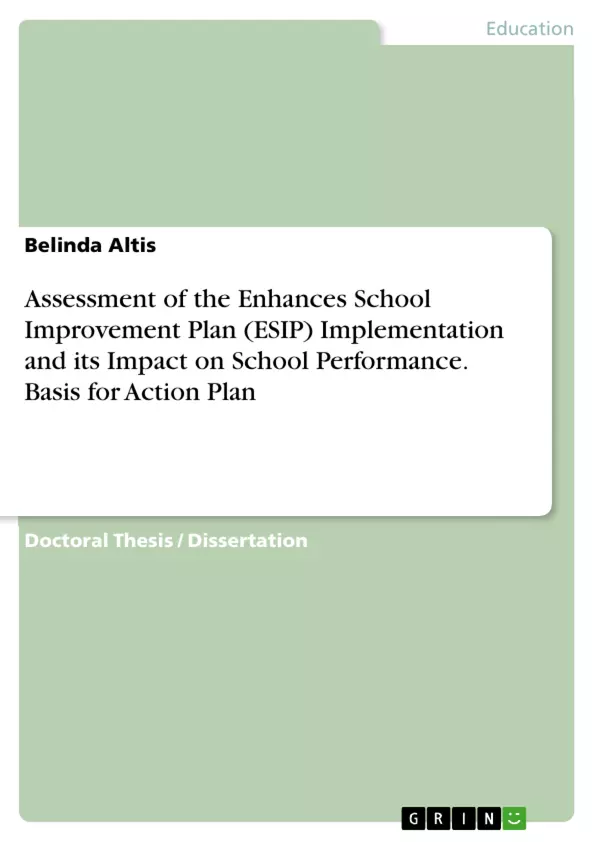This paper assesses the implementation of the Enhanced School Improvement Plan (ESIP) and its impact on school performance among six public schools, selected using simple random sampling, in the Division of Manila. Anchored on the Effective School Improvement (ESI) model by Stoll, et al. (2006, 2002), the study uses both quantitative and qualitative research techniques. The use of an exploratory mixed methods research design as espoused by Creswell (2003) is adapted by the researcher. This mixed methods research design calls for the collection and analysis of data in two consecutive phases of a single study: first, quantitative data, and then qualitative data. While theme analysis was used to analyze the data from the qualitative phase, percentages and weighted averages were calculated for the quantitative phase's data using the Statistical Package for Social Sciences (SPSS). After careful analysis of data which were treated both qualitatively and quantitatively, results showed that the Division of Manila's Enhanced School Improvement Plans were carried out with success. By establishing an efficient, open, and cooperative system for governing and managing basic education, the ESIP guided the school principals in making sure that every kid in their community has access to a high-quality education.
Inhaltsverzeichnis (Table of Contents)
- Chapter 1: Introduction
- Background of the Study
- Statement of the Problem
- Hypothesis of the Study
- Scope and Delimitation of the Study
- Significance of the Study
- Definition of Terms
- Chapter 2: Review of Related Literature
- The Concept of School Improvement Planning
- The Enhanced School Improvement Plan (ESIP)
- The Effective School Improvement (ESI) Model
- School Performance and Its Indicators
- Factors Affecting School Performance
- Chapter 3: Research Methodology
- Research Design
- Research Locale
- Participants of the Study
- Research Instruments
- Data Collection Procedure
- Data Analysis Procedure
- Chapter 4: Presentation, Analysis and Interpretation of Data
- Profile of the Respondents
- Implementation of the Enhanced School Improvement Plan (ESIP)
- Impact of the ESIP on School Performance
- Chapter 5: Summary, Conclusions and Recommendations
Zielsetzung und Themenschwerpunkte (Objectives and Key Themes)
This dissertation investigates the implementation of the Enhanced School Improvement Plan (ESIP) in six public schools in the Division of Manila and its impact on school performance. The study aims to assess the effectiveness of the ESIP in improving school outcomes and to provide a basis for developing an action plan for future improvements.
- Effectiveness of the ESIP implementation
- Impact of the ESIP on student learning and achievement
- Role of school leadership in ESIP implementation
- Factors influencing ESIP implementation
- Recommendations for improving the ESIP
Zusammenfassung der Kapitel (Chapter Summaries)
- Chapter 1: Introduction This chapter provides an overview of the study, including the background of the problem, statement of the problem, hypothesis, scope and delimitation, significance of the study, and definition of terms.
- Chapter 2: Review of Related Literature This chapter presents a comprehensive review of existing literature on school improvement planning, the Enhanced School Improvement Plan (ESIP), the Effective School Improvement (ESI) model, school performance, and factors affecting school performance.
- Chapter 3: Research Methodology This chapter describes the research design, participants, instruments, data collection procedures, and data analysis methods used in the study.
- Chapter 4: Presentation, Analysis and Interpretation of Data This chapter presents the findings of the study, analyzing the data collected through surveys and interviews. The chapter examines the implementation of the ESIP, its impact on school performance, and the factors influencing implementation.
Schlüsselwörter (Keywords)
This research focuses on the implementation of the Enhanced School Improvement Plan (ESIP) in public schools, specifically examining its impact on school performance. Key concepts include the Effective School Improvement (ESI) model, simple random sampling, mixed methods research, and the use of the Statistical Package for Social Sciences (SPSS) for data analysis. The study emphasizes the importance of a holistic approach to school improvement that addresses both quantitative and qualitative aspects of school performance.
- Citation du texte
- Belinda Altis (Auteur), 2024, Assessment of the Enhances School Improvement Plan (ESIP) Implementation and its Impact on School Performance. Basis for Action Plan, Munich, GRIN Verlag, https://www.grin.com/document/1486879



